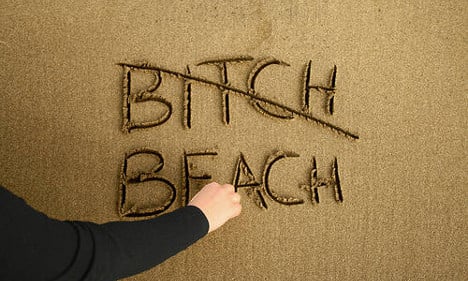Learners of the French language can often make embarrassing, rude and silly mistakes. However, it is important to note that the French themselves can often leave us red-faced by some of their unfortunate mistakes, or more to the point the mispronunciations that they make in English.
Here are ten of the worst that you might have come across during your time in France, and for our French readers we've added some pronunciation tips to help you avoid making these gaffes in the future.
Sheet, not sh*t
If you’ve just moved in with your new French lover, don’t let your new-found domestic bliss be disturbed when you hear a shout from the other room: “Help me put this shit in the washing machine.” Your special one (probably) just wants a hand with the linen.
Pronunciation tip: A bed 'sheet' is pronounced with a long 'eee' sound.
 Be careful what you're suggesting to put on the bed. Photo: Kayla Kandzorra/ Flickr
Be careful what you're suggesting to put on the bed. Photo: Kayla Kandzorra/ Flickr
A fork, not f**k
You're out at a romantic restaurant to celebrate Valentine's Day and need an extra fork to share dessert. But before you can stop them your French partner has asked the astonished waiter for a f**k. You have to step in and apologize before the waiter obliges.
Pronunciation tip: For fork it's just the number ‘four’ rounded off with a ‘kuh’.
 Think, number four. Photo: SwedishCarina/ Flickr
Think, number four. Photo: SwedishCarina/ Flickr
Beach, not b***h
The French famously love their summer holidays. But do your Gallic friends a favour and warn them about how they convey their enjoyment to avoid misunderstandings like this. “How was your trip to the Riviera with Sophie?” “Wonderful, we sat on the bitch all week.”
Pronunciation tip: The place with the sand and the sea is pronounced with a long e sound.
 Sitting on the beach. Photo: Jonaycp/ Flickr
Sitting on the beach. Photo: Jonaycp/ Flickr
Fair enough, not furry muff
Getting the basics of any language right is one thing. But moving on to slang should be approached with care. French reader Farida tells us why:
“I once heard an English colleague say ‘furry muff’ instead of “fair enough”, and I started using it with clients on the phone, thinking it was cool. I was soon asked never to use it again.”
Pronunciation tip: If in doubt, leave it out. You don’t have to fit in right away.
 Furry muff? Photo: David Goehring/ Flickr
Furry muff? Photo: David Goehring/ Flickr
'You're funny', not 'your fanny'
Pillow-talk is one area where French men excel. The accent, the poetry, the sweet nothings. But if you ask your very own Serge Gainsbourg: “What do you love most about me?” and he replies: “Your fanny”, have a sense of humour about it.
After all, that’s what he was trying to say – “You’re funny.”
Pronunciation tip: This mistake can be hard to avoid. Say the word 'fun' with a 'nee' on the end or just say 'hilarious'.
 Not the kind of compliment you were hoping for. Photo: Timothy.tolle/ Flickr
Not the kind of compliment you were hoping for. Photo: Timothy.tolle/ Flickr
Sticky, not stiffy
Back to those awkward moments in restaurants. Not many French people will end up leaving their partner red-faced because of a 'sticky toffee pudding' but it happens, as one reader explained:
“My French girlfriend was crazy about this dessert and ordered it whenever it was on the menu. The problem was she couldn't pronounce it correctly and kept asking for a 'Stiffy toffee pudding'.
Pronunciation tip: Just order the ice cream.
 Sticky toffee pudding. Photo: Chatirygirl/ Flickr
Sticky toffee pudding. Photo: Chatirygirl/ Flickr
No you 'can't', not c**t
You’re at a ticket machine in the Paris Metro, about to do some sight-seeing with your French guide. You ask if you can pay with your credit card, and the member of the staff replies “No, you c**t.”
Don’t immediately ask for a complaints form – the helpful employee was probably just trying to say, “No, you can’t.”
Pronunciation tip: It depends which part of the Anglo-speaking world you're in, but just to be safe you should pronounce 'can't' with a long vowel sound as if it was spelled 'carnt'. Or do as other Anglos (like Americans) do and say it just like the word “can” with a soft T at the end.
 How rude. Photo: dr_zoidberg/ Flickr
How rude. Photo: dr_zoidberg/ Flickr
Peace and quiet, not p**s and quiet
A reader who lived in Britain with his French partner tells us he lost all credibility during an argument one night with some noisy neighbours when his girlfriend leaned out the window and shouted:
“Please just let us sleep in piss!” Needless to say they got no 'peace' after that.
Pronunciation tip: Same old mistake between a long 'e' sound and a short 'i' sound? 'Peace' rhymes with the way the French say Nice, and so does 'piece' as in 'piece of cake'.
 Shhhh. Photo: DaMongMAn/ Flickr
Shhhh. Photo: DaMongMAn/ Flickr
Coke, not cock
Bill, a Canadian reader who works in Paris tells us he was shocked at what he was offered at a party one night. “I walked in, said hello, and the host shouted at me with a smile: ‘Do you want some c**k?’ I was a bit taken aback until I turned to see the bottle of coca cola in his hand.”
Pronunciation tip: An ‘e’ at the end of the word lengthens the vowel in the middle. Think ‘oh!’ for 'coke'.
 Be careful what you offer. Photo: muammerokumus/ Flickr
Be careful what you offer. Photo: muammerokumus/ Flickr
Focus, not 'f**k us'
And lastly…. Sometimes learning a new language requires serious levels of concentration. Get one vowel sound wrong, and “Can you focus please?” becomes a very different kind of request, as this short, helpful video tutorial explains.




 Please whitelist us to continue reading.
Please whitelist us to continue reading.
Member comments